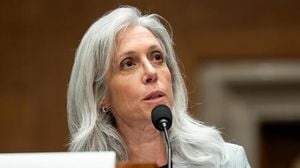On Tuesday, May 6, 2025, Veterans Affairs Secretary Doug Collins faced intense scrutiny during a Senate oversight committee hearing regarding his plans to significantly reduce the Department of Veterans Affairs (VA) workforce. Collins, who has been in office for just three months, described the VA as a bureaucracy in severe disarray, asserting that reforms are necessary to improve the department's efficiency and service to veterans.
Collins stated that staffing levels at the VA had grown roughly 20% from the start of fiscal year 2019 to the end of fiscal year 2024. In fiscal year 2023 alone, the Veterans Health Administration (VHA) hired 61,000 new employees, marking the highest rate of hiring in 15 years. However, Collins maintained that this increase in personnel had not translated into improved services, citing worsening claims backlogs and increased appointment wait times.
During the hearing, Collins outlined his goal to reduce the VA's workforce by approximately 15%, which translates to cutting around 80,000 positions. He emphasized that this figure is a target subject to change, stating, "A goal is not a fact. You start with a goal and then use the data to make the best choices you can." He expressed frustration over the public disclosure of this target, which he claimed was used to scare veterans and employees.
Collins assured lawmakers that the cuts would not impact essential positions such as doctors, nurses, or claims processors. Instead, he indicated that nonessential roles, such as interior designers and diversity officers, would be phased out. He argued that savings from these cuts would be redirected to enhance veteran healthcare and benefits.
Despite Collins' reassurances, bipartisan concerns emerged regarding the potential implications of such significant workforce reductions. Committee Chairman Jerry Moran (R-Kan.) urged that any cuts should not be arbitrary but rather based on data and aimed at improving outcomes for veterans. He emphasized the need for a quality, accountable workforce and expressed the importance of treating employees with respect.
Ranking Member Richard Blumenthal (D-Conn.) highlighted that a substantial portion of the new hires since 2019 are healthcare employees, warning that slashing these positions could diminish the quality and access of care for veterans. "You cannot slash and trash the VA without eliminating essential positions which provide access and availability of health care," Blumenthal asserted.
Collins responded to these concerns by emphasizing that the VA had not fired anyone directly involved with veteran care. However, lawmakers pointed out that cutting support positions would inevitably affect the overall care veterans receive. Blumenthal remarked, "We know that support personnel are absolutely necessary for scheduling appointments or fixing IT systems. Those burdens will fall to others, or they will simply fall through the cracks, if you slash and trash the VA."
The hearing was marked by tense exchanges, with Collins defending his approach amid accusations from Democrats that the Trump administration was dismantling the VA rather than improving it. Collins countered these claims by stating, "To simply say that where we came in was okay, everyone knows that was just simply not true." He argued that the department's past management had failed to address long-standing issues.
In the wake of the hearing, veterans and Democratic lawmakers rallied outside the U.S. Capitol to protest the proposed cuts. Holding signs that read "Veterans Healthcare Not For Sale," they expressed their fears that the reductions would compromise the quality of care provided by the VA. Jose Vasquez, executive director of the advocacy group Common Defense, stated, "They call this efficiency, but we call it betrayal," emphasizing the reliance of millions of veterans on the VA for critical healthcare services.
Collins defended the need for the cuts, stating that the VA must focus on its core mission of serving veterans rather than maintaining a bloated bureaucracy. He noted that the VA had been under scrutiny for its handling of veteran care, particularly after the implementation of the PACT Act, which expanded eligibility for veterans exposed to toxic substances.
As the Senate prepares to debate the VA's fiscal 2026 budget, the conflict over the department's future and the necessary level of reform is expected to intensify. The White House has proposed a 4% increase in funding for veterans programs, even as workforce cuts loom on the horizon. Lawmakers from both parties continue to grapple with the challenge of balancing fiscal responsibility with the imperative to provide quality care for veterans.
Collins reiterated his commitment to ensuring that veterans have access to the healthcare and benefits they have earned, while also advocating for necessary reforms to address the VA's systemic issues. He acknowledged the complexity of the task ahead, stating, "We want to work with Congress to fix the VA. But our shared goals need to be making things better for the veterans, not protecting a department’s broken bureaucracy."
As discussions continue, the future of the VA workforce remains uncertain, with many veterans and advocates closely monitoring the situation. The outcome of the proposed cuts and the direction of the department will have significant implications for the millions of veterans who rely on the VA for their healthcare and benefits.






